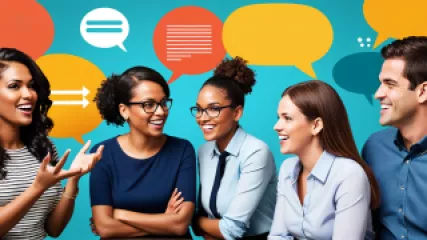Mastering Verbal Communication: The Ultimate Guide
Welcome to the ultimate guide on mastering verbal communication! Effective communication is an essential skill for personal and professional success. Whether you want to improve your relationships, advance your career, or simply express yourself more clearly, enhancing your communication skills can have a profound impact on your life. In this comprehensive guide, we will explore various strategies and techniques to help you become a confident and effective communicator.
Why Are Communication Skills Important?
Communication is the foundation of human interaction. It allows us to convey our thoughts, feelings, and ideas to others, fostering understanding and connection. Strong communication skills are crucial in all aspects of life, from building healthy relationships to excelling in the workplace.
Effective communication can:
- Strengthen personal relationships
- Enhance teamwork and collaboration
- Improve conflict resolution
- Boost leadership abilities
- Increase job satisfaction and success
By investing time and effort into improving your communication skills, you can unlock a world of opportunities and experiences.
The Components of Verbal Communication
Verbal communication involves the use of spoken words and encompasses various elements that contribute to effective communication. Let's take a closer look at each component:
1. Vocabulary and Language
Your choice of words and language greatly impacts how your message is received. Expanding your vocabulary and using appropriate language for different situations can help you express your thoughts more precisely and avoid misunderstandings.
2. Tone of Voice
The tone of voice you use can convey emotions, intentions, and attitudes. Paying attention to your tone and adjusting it accordingly can significantly impact how your message is interpreted by others.
3. Clarity and Conciseness
Being clear and concise in your communication helps ensure that your message is understood accurately. Avoiding jargon, using simple language, and organizing your thoughts coherently can improve comprehension.
4. Active Listening
Effective verbal communication is a two-way street. Developing active listening skills allows you to fully understand others and respond appropriately. Active listening involves giving your full attention, asking clarifying questions, and demonstrating empathy.
Strategies to Improve Verbal Communication Skills
Now that we understand the importance of verbal communication and its key components, let's explore some strategies to enhance your skills:
1. Practice Mindful Communication
Mindful communication involves being fully present and engaged in conversations. Avoid distractions, such as electronic devices, and focus on the person you are communicating with. Listen attentively, maintain eye contact, and respond thoughtfully.
2. Seek Feedback
Feedback is a valuable tool for growth and improvement. Ask trusted friends, family members, or colleagues for feedback on your communication style. Their insights can provide valuable perspectives and help you identify areas for improvement.
3. Hone Your Nonverbal Communication
Nonverbal cues, such as body language, facial expressions, and gestures, play a significant role in communication. Pay attention to your nonverbal signals and ensure they align with your intended message. Practicing good posture, maintaining eye contact, and using appropriate hand gestures can enhance your overall communication effectiveness.
4. Expand Your Vocabulary
Invest time in expanding your vocabulary by reading books, articles, and diverse literature. Learning new words and their nuances can help you express yourself more precisely and effectively.
5. Join Public Speaking Clubs or Classes
Public speaking clubs or classes, such as Toastmasters International, provide a supportive environment to practice and improve your communication skills. These platforms offer opportunities to deliver speeches, receive constructive feedback, and build confidence in expressing your ideas.
6. Engage in Active Listening
Active listening is crucial for effective communication. Practice active listening by focusing on the speaker, avoiding interruptions, and paraphrasing their message to ensure understanding. This demonstrates respect and enhances your ability to respond appropriately.
7. Use Visualization Techniques
Visualization techniques can help reduce anxiety and improve your overall communication performance. Before important conversations or presentations, visualize yourself speaking confidently and successfully conveying your message.
8. Embrace Constructive Conflict Resolution
Conflict is a natural part of human interaction. Developing skills in conflict resolution can help you address disagreements constructively and maintain healthy relationships. Learn techniques such as active listening, empathy, and finding common ground to resolve conflicts effectively.
Online Support for Communication Skills
In today's digital age, online resources and support are readily available to help you enhance your communication skills. Here are some options to consider:
1. Online Courses and Webinars
Many platforms offer online courses and webinars specifically designed to improve communication skills. These programs often include interactive exercises, expert guidance, and practical tips to enhance your verbal communication abilities.
2. Communication Apps
There are several mobile apps available that can help you practice and improve your communication skills. These apps may provide speech analysis, pronunciation exercises, and interactive dialogues to enhance your verbal communication abilities.
3. Online Therapy for Communication Skills
If you struggle with specific communication challenges or social anxiety, online therapy can be a valuable resource. Licensed therapists can provide guidance, support, and evidence-based strategies to help you overcome barriers and improve your communication skills.
The Journey to Mastering Verbal Communication
Mastering verbal communication is an ongoing journey that requires practice, patience, and self-reflection. Embrace each opportunity to communicate as a chance to grow and learn. Remember, effective communication is not just about expressing yourself; it's also about understanding and connecting with others. By continuously honing your communication skills, you can achieve personal growth, enrich your relationships, and thrive in various areas of your life.
In conclusion, mastering verbal communication is a lifelong pursuit that can greatly enhance your personal and professional relationships. By implementing the strategies outlined in this ultimate guide, such as practicing mindful communication, expanding your vocabulary, and seeking feedback, you can become a confident and effective communicator. Remember, effective communication is a skill that can be developed with time and effort. Start your journey today and unlock the power of effective verbal communication!






